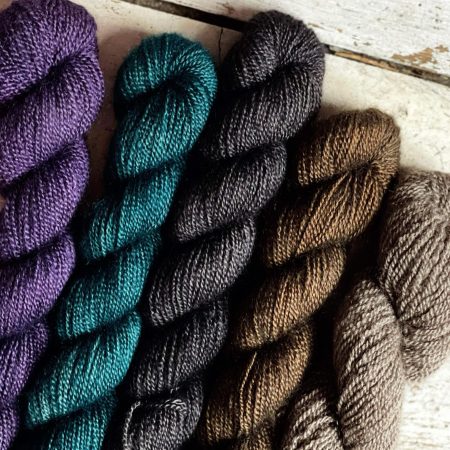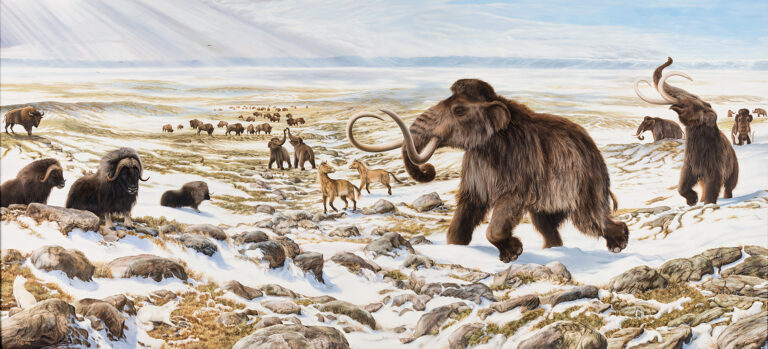Qiviut - Arctic Gold
A Musk-Ox yarn
WHAT IS QIVIUT
Qiviut (kiv’-ee-ute) is the soft down under-wool produced by musk oxen. Qiviut is one of the unique adaptations of musk oxen which makes it possible to survive the freezing arctic winters. Muskoxen do not migrate like caribou but they will range over a great swath of territory. Summers are spent in lush river valleys where food is abundant. During the harsh winters musk oxen will habitat high wind-swept tundra, where snow is scoured from their environment and they can access the meager sustenance left behind. Their outer layer of hair, known as guard hair, protects them from insects and sheds water away from their skin. Beneath, qiviut grows between their toes, up their nose, and everywhere in-between keeping them warm in the coldest of arctic chills. Qiviut is eight times warmer than sheep’s wool and is one of nature’s finest fibers with a micron count (diameter) that is approximately thirty percent finer (skinnier!) than the finest cashmere and is not itchy or scratchy like wool.

SOFTNESS AND ODOUR
Softer than cashmere, Qiviut is not the least bit scratchy. And, unlike other fibers, the more you handle and wash qiviut, the softer it feels!!
It’s hypoallergenic and does not have an odour, even when wet. And it’s extremely durable.
RARITY
Annually only 5-6 tons of this wool is available (compared with the annual output of the cashmere goat wool of 350,000 tons)
INSULATION
The incredible insulating properties of Qiviut fibers comes from the fact that they are comprised of 60% air ducts. This amazing fiber allows the animals to withstand harsh arctic storms and extreme temperatures.
EXTREMELY LIGHT WEIGHT
Qiviut is extremely light weight (finer in diameter than cashmere and much softer than cashmere). It is the only natural fibre that doesn’t compress when wet. It doesn’t shrink if washed in hot water. In fact, washing it makes it loft higher. It doesn’t lose its insulation value when wet, either.
INVESTMENT
It’s not called “Arctic Gold” for no reason. The special properties of musk ox wool will not lose its value.
| MUSK-OX FROM THE HARSHEST CLIMATES OF THE WORLD
MUSK-OXES : WHO WE ARE
Muskox are large and hairy goat-like mammals with impressive horns, adapted to extremely cold grassland environments. There were originally two types of muskox in North America but only the tundra Muskoxen (Ovibos moschatus) survived the megafuana extinction associated with the end of the last age.
Muskox crossed the land bridge from Siberia to North America during the last ice age about 90,000 years ago and thrived with the Wooly Mammoth and other large mammals on the dry, cold grassland of Alaska and Yukon that was never glaciated called Beringia. Muskox also lived just south of the edges of glaciers, and their range expanded about 10,000 years ago as the circumpolar glaciers disappeared. They spread across the Arctic from Siberia, to Alaska, across the Arctic Archipelago and mainland tundra of Canada, to Greenland. At one time during the ice age, their range included areas as far south as Toronto, Canada.
SUSTAINABLE HARVEST
By the early 1900’s the muskox population collapsed across the circumpolar north. This was caused by over-harvesting associated with the unregulated expansion of the whaling industry into remote arctic areas who required protein for the crew, and the unregulated expansion of the fur trade around the circumpolar Arctic. Muskox were extirpated almost everywhere, with the exception of a few inland arctic locations in Canada. A Canadian hunting ban was implemented in 1917. The population recovered several decades later in Canada to the point that muskox were transplanted from Canada back to Alaska, Northern Quebec, Greenland, and Russia. Today the muskox population has recovered in Canada. Sub-populations of muskox fluctuate with natural conditions. Neither scientists nor Inuit know all the reasons for this but may include cycles of disease, predators, parasites, and feed availability.
Because the overall muskox population is relatively stable and carefully managed by the government, products made of qiviut have no treaties affecting international trade.
